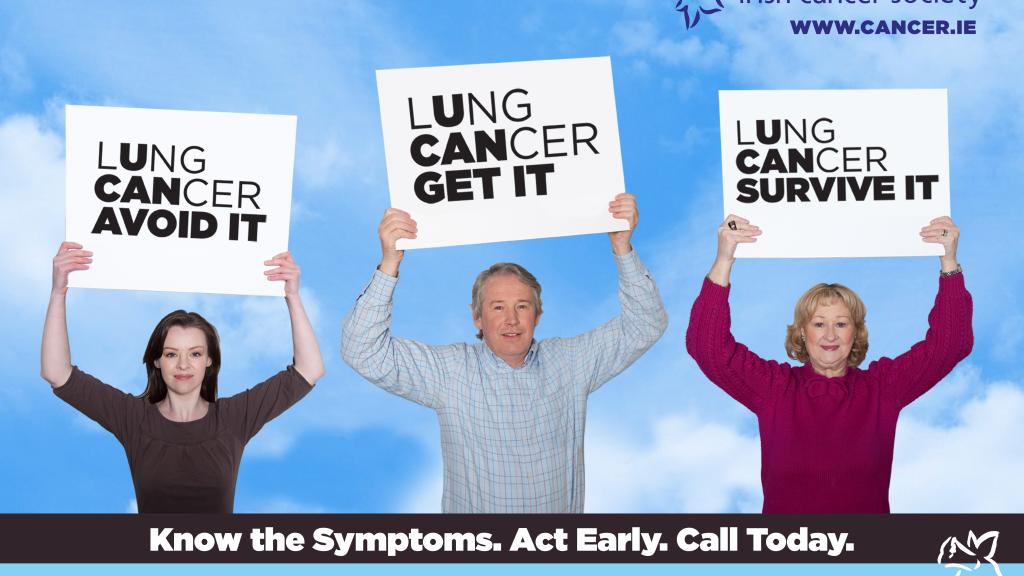
Irish Cancer Society Concerned Over Rising Lung Cancer Rates in Women
Society encourages everyone to ‘Look After Your Lungs’ in 2012
At the launch of the Irish Cancer Society’s Lung Cancer Awareness campaign 2012, the Society has expressed concern at a recent report which shows lung cancer has overtaken breast cancer as the biggest cause of cancer death in women in Ireland for the first time. This year the Society is encouraging everyone to ‘Look After Your Lungs’, know how best to prevent lung cancer, know the signs and symptoms and if you are concerned, go to your GP.
Lung Cancer is now the biggest cancer killer in Ireland for both men and women with 1,708 people dying in 2010 (1,006 men and 702 women). Breast cancer deaths for the same period amounted to 634. New cases of lung cancer in women have increased by 17.6 percent in 2010 whereas breast cancer cases are increasing at a much lower rate. Smoking is the key cause of lung cancer and the number of cases is expected to grow each year as we see the effect of increasing numbers of women smoking over the past 20 years take hold.
The key to improving survival for lung cancer patients is early detection and the good news is that in Ireland there is now a clear diagnosis and treatment plan in place for patients. Rapid Access Clinics for lung cancer have been set up in all eight of the designated cancer centres. According to the most recent data for 2011, 1,940 new patients were seen in the rapid access clinics, 89 percent of whom saw a specialist within two weeks of referral.
Irish Cancer Society spokesperson Norma Cronin said “We know that with early detection, there is a very real chance of effective treatment for lung cancer. The late stage of presentation of lung cancer in the past meant treatment options were limited, but now there is a clear plan to ensure that people are fast tracked so that diagnosis is made and treatment started quickly. Anyone concerned about lung cancer can now go to their GP where they will be examined and if necessary, referred to a rapid access clinic.”
Dr. Finbarr O’Connell, consultant respiratory physician, St. James's Hospital, Dublin said “Lung cancer is the biggest cancer killer in Ireland for both men and women. Now more than ever, awareness campaigns like the one the Irish Cancer Society is launching today are crucial to educate people about how lung cancer can be prevented as well as the signs and symptoms and the importance of early detection. Recent international studies on lung cancer screening in high risk populations have shown positive results, however more studies are required. In the meantime it is vital that people go to their GP or call the National Cancer Helpline if they are concerned about lung cancer or if they have any of the signs of symptoms.”
In August 2011, the primary results of the National Lung Cancer Screening Trial (NLCST) were published, opening the debate on lung cancer screening. This trial enrolled more than 50,000 current or former heavy smokers across the United States comparing the results of two methods of screening for lung cancer. The results showed that participants who were screened with low-dose helical computed tomography (CT) had a 20 percent lower risk of dying from lung cancer than those screened with a standard chest X-ray. This has had a knock-on effect worldwide and most recently, the UK Lung Cancer Screening Trial (UKLS) has commenced. It hopes to highlight the importance of a national screening programme for lung cancer in the UK. This trial is also using CT scans to screen people considered high risk for lung cancer.
Dr. O’Connell continued “While international trials are useful, it is important that we establish whether or not lung cancer screening would be of benefit to the high risk Irish population. With the UKLS trial now in progress, there is a real opportunity for Irish collaboration.”
The Irish Cancer Society is strongly encouraging those concerned about lung cancer to call the Society’s National Cancer Helpline on Freefone 1800 200 700, or to visit their GP. The Society has developed a new publication called “Look After Your Lungs” which is full of information and advice on how to improve your health and be aware of the early signs and symptoms of lung disease. Copies are available free from the Helpline. The National Cancer Helpline offers free, confidential advice, support and information on any question about cancer. Anyone concerned about lung cancer can ring in confidence and speak to a specialist nurse.
